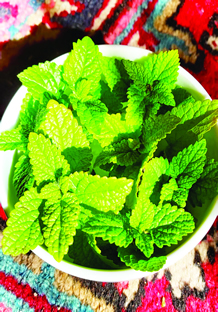Herbal Spotlight: Lemon Balm
By Shannon Joyner, Garden Companion Editor
 Lemon balm (Melissa officinalis) is an easy-to-grow, bee-friendly perennial herb and a member of the mint family. Native to Europe and central Asia, it is now found across temperate and subtropical regions all over the world. Records concerning its use as a medicinal plant in the Mediterranean region and Europe date back over 2000 years, with beneficial effects said to include regulating sleep, appetite and digestion, reducing anxiety, and relieving pain. Modern research shows that various extracts of lemon balm may be effective at treating anxiety, insomnia, cold sores, gastrointestinal ailments, and Alzheimer's disease. Herbalists often recommend lemon balm as a "children's herb" because small amounts of lemon balm tea can be given to teething or colicky babies to help reduce discomfort. However, while lemon balm is generally considered safe for short-term use, it can have significant side-effects for certain individuals, so long-term use or overuse is not recommended. PLEASE NOTE: the content in this article is meant to inform, not to diagnose or treat any ailment. Always use common sense, and consult with your healthcare provider before attempting to treat yourself or others in any way. Lemon balm (Melissa officinalis) is an easy-to-grow, bee-friendly perennial herb and a member of the mint family. Native to Europe and central Asia, it is now found across temperate and subtropical regions all over the world. Records concerning its use as a medicinal plant in the Mediterranean region and Europe date back over 2000 years, with beneficial effects said to include regulating sleep, appetite and digestion, reducing anxiety, and relieving pain. Modern research shows that various extracts of lemon balm may be effective at treating anxiety, insomnia, cold sores, gastrointestinal ailments, and Alzheimer's disease. Herbalists often recommend lemon balm as a "children's herb" because small amounts of lemon balm tea can be given to teething or colicky babies to help reduce discomfort. However, while lemon balm is generally considered safe for short-term use, it can have significant side-effects for certain individuals, so long-term use or overuse is not recommended. PLEASE NOTE: the content in this article is meant to inform, not to diagnose or treat any ailment. Always use common sense, and consult with your healthcare provider before attempting to treat yourself or others in any way.
You can buy many ready-made lemon-balm products in stores, but it's easy to make your own tincture at home:
Roughly chop enough fresh lemon balm to fill a pint jar, pressing it down a bit with a clean spoon. Pour in approximately 1 1/2 cups of vodka (at least 80 proof, 100 proof is better), pushing the leaves down to make sure they're submerged. Cover the jar with a lid, and place in a cool, dark place for at least 4 to 6 weeks (up to several months), giving it a gentle shake for the first few days to make sure the leaves stay covered. When you’re ready to use the tincture, strain out the leaves and store the liquid in dropper bottles for easy use. Working with your healthcare provider, you can start with taking one dropper full at a time to see how that works for you, then adjust the dose to suit your needs.
top | Newsletter Home |Table of Contents| Archive

|


 Lemon balm (Melissa officinalis) is an easy-to-grow, bee-friendly perennial herb and a member of the mint family. Native to Europe and central Asia, it is now found across temperate and subtropical regions all over the world. Records concerning its use as a medicinal plant in the Mediterranean region and Europe date back over 2000 years, with beneficial effects said to include regulating sleep, appetite and digestion, reducing anxiety, and relieving pain. Modern research shows that various extracts of lemon balm may be effective at treating anxiety, insomnia, cold sores, gastrointestinal ailments, and Alzheimer's disease. Herbalists often recommend lemon balm as a "children's herb" because small amounts of lemon balm tea can be given to teething or colicky babies to help reduce discomfort. However, while lemon balm is generally considered safe for short-term use, it can have significant side-effects for certain individuals, so long-term use or overuse is not recommended. PLEASE NOTE: the content in this article is meant to inform, not to diagnose or treat any ailment. Always use common sense, and consult with your healthcare provider before attempting to treat yourself or others in any way.
Lemon balm (Melissa officinalis) is an easy-to-grow, bee-friendly perennial herb and a member of the mint family. Native to Europe and central Asia, it is now found across temperate and subtropical regions all over the world. Records concerning its use as a medicinal plant in the Mediterranean region and Europe date back over 2000 years, with beneficial effects said to include regulating sleep, appetite and digestion, reducing anxiety, and relieving pain. Modern research shows that various extracts of lemon balm may be effective at treating anxiety, insomnia, cold sores, gastrointestinal ailments, and Alzheimer's disease. Herbalists often recommend lemon balm as a "children's herb" because small amounts of lemon balm tea can be given to teething or colicky babies to help reduce discomfort. However, while lemon balm is generally considered safe for short-term use, it can have significant side-effects for certain individuals, so long-term use or overuse is not recommended. PLEASE NOTE: the content in this article is meant to inform, not to diagnose or treat any ailment. Always use common sense, and consult with your healthcare provider before attempting to treat yourself or others in any way.